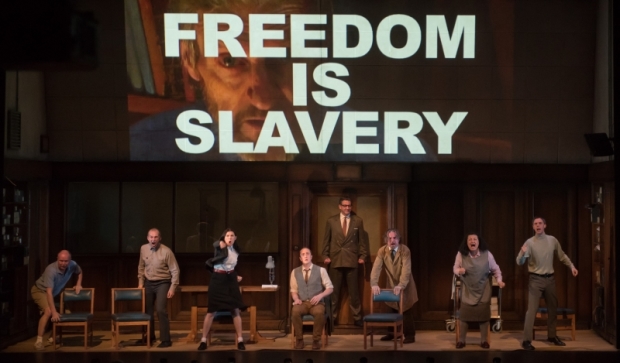
(© Ben Gibbs)
Robert Icke and Duncan Macmillan’s adaptation of 1984, George Orwell’s bleak, dystopian novel, is one of the finest page-to-stage adaptations in recent memory.
Winston Smith (a tremendous Matthew Spencer) works in the records department of the Ministry of Truth, where he is responsible for editing historical records so that they always reflect the “approved” version of events. He strikes up a love affair with Julia (Hara Yannas), who, it turns out, shares his interest in bringing Big Brother down. In a world of constant surveillance, where two-way telescreens hang in every room, they will need to escape someplace where Big Brother can’t watch them.
They rent a secret apartment above a shop. Covered in photos, it is the “one place in the world where the past still exists.” This secret apartment is located backstage, where, like a voyeuristic television show, the audience sees their time spent in there playing out in grainy video (designed by Tim Reid). Winston and Julia know that their resistance efforts will probably lead to their demise, though they soldier on in the name of future generations.
“An idea is the only thing that has ever changed the world,” Winston says. He sets his sights on O’Brien (Tim Dutton), a powerful Party member who he thinks might share the same rebellious ambitions. Furthermore, he suspects that he might be a member of the fabled Brotherhood, an underground network dedicated to bringing down Big Brother. O’Brien invites Winston and Julia to his apartment where he admits that he is, indeed, a member of the Brotherhood, and he inducts them into the society.
O’Brien is, in fact, a high-ranking official of the Inner Party that has been watching Winston for years. That secret apartment that Winston thought was free from Big Brother’s eye? Not so. The apartment is raided, and the rebellious lovebirds are arrested. Ultimately, they are taken to Room 101, a room in the Ministry of Love, where the most serious thought criminals are taken.
The play, now running at the American Repertory Theater, adheres closely to the major plot points of the novel, though much of the story has been condensed and streamlined. A familiarity with the source material is helpful, particularly in the first 30 minutes of the play. 1984 progresses with breakneck speed, yet abruptly slows to a menacing crawl in its final 20 minutes, which features a gruesome, extended torture scene. The intensity of the play’s climax is not easy to digest, and the performance I attended saw a few walkouts.
The rushed exposition works just fine, though the character of Julia could stand to be fleshed out a bit more. Still, this 1984 is a marvel of theatricality and intense vision. The play is directed with electrifying precision by Icke and Macmillan, who have also managed to coax vivid, visceral performances from this top-shelf cast. In a performance of unqualified intensity, Matthew Spencer’s Winston manages to be both gentle and fervid. Hara Yannas’ Julia is a bit one-dimensional, though her role here has been tempered. As O’Brien, Tim Dutton has the charm of a politician and the ferocity of a dictator. The rest of the cast, rounded out by Simon Coates, Stephen Fewell, Christopher Patrick Nolan, Ben Porter, and Mandi Symonds, functions as an air-tight unit whose portraits are just as precise as the play itself.
With an impossibly detailed lighting design by Natasha Chivers that casts menacing shadows all over Chloe Lamford’s set design, much of 1984‘s splendor is owed to the designers. Tom Gibbons’ sound cranks things up to the next level, and the effects are frightening and cinematic.
One need not dig too deep to find chilling parallels between Orwell’s vision of the future and our world as we know it now: from constant surveillance and war to even some schools wishing to gloss over certain chapters of American history in textbooks. But the most frightening morsel of truth spoken in the play refers not to matters of politics or censorship, but to the citizens: “They will not look up from their screens long enough to notice what’s really happening.” Isn’t that the truth?









